Chart of the week: 72% of consumers will only engage with personalized marketing messages, despite 86% being concerned about data privacy
Personalization is becoming more prominent in digital marketing, offering an improved user experience by providing information or targeting ads based on an individual’s activities and interests. In fact, according to a new report from SmarterHQ, 72% of consumers say they now only engage with marketing messages that personalized and tailored to their interests.
Despite this, the same report also reveals that 86% of consumers are concerned about their data privacy. Of these, Baby Boomers and Gen X are the least trusting o consumers, with Millennials and Gen Z being around 47% more trusting than their older counterparts.
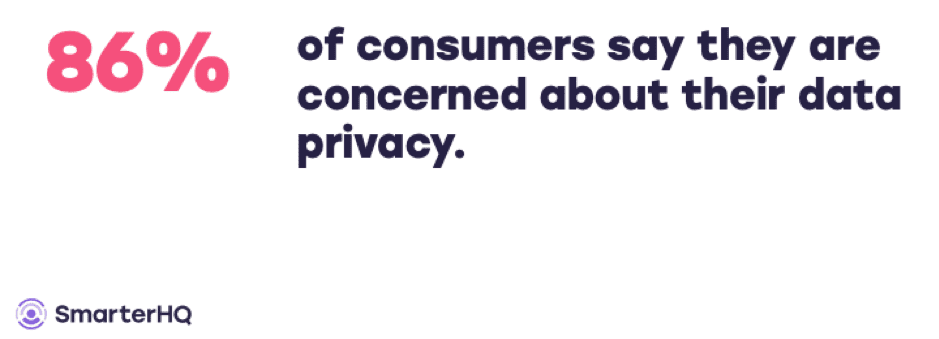
This is likely due, at least in part to an increase in high profile data breaches and the fact that ads start following people around the internet after they have searched for or purchased a specific product.
Most trusted brands
When it comes to collecting data, the report found that consumers are happy for companies to store information that will help their future interactions with a brand. The type of data most consumers are happy for brands to collect is the products they have purchased. This is followed by the categories they’ve looked at on a site, how long since they last visited the website and their email address.
In comparison, consumers are not happy with their name, phone number or address being collected by companies, unless they have voluntarily provided this information.
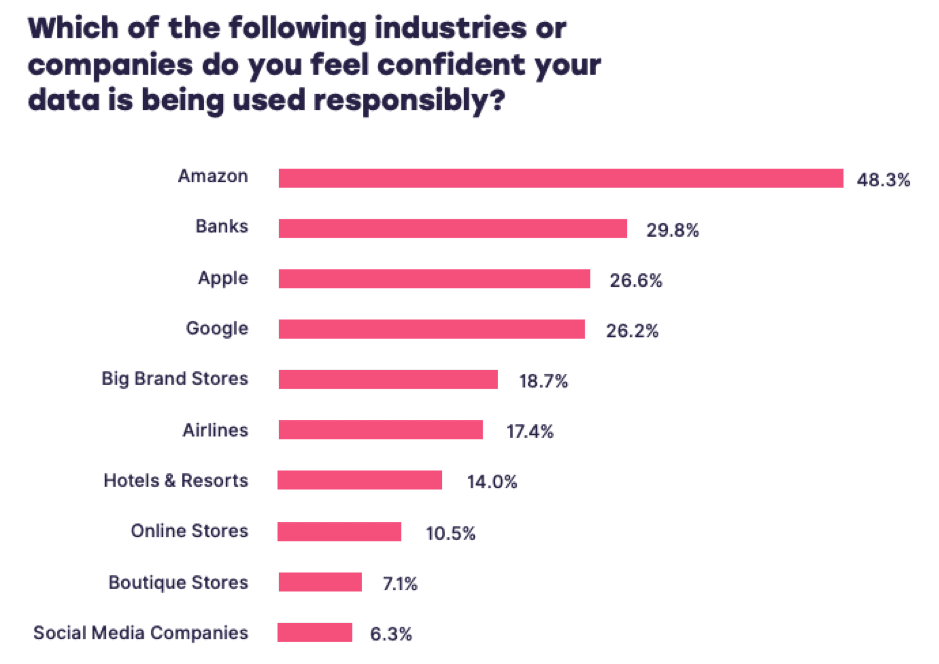
Amazon is the most trusted retailer when it comes to customer data, with 48% of consumers saying it is the brand or industry they trust most to use their data responsibly. In fact, Amazon beat banks to the top spot, which arguably have stricter rules and regulations to follow when it comes to consumer data.
Among Gen z and millennials, this trust for Amazon is even greater, with consumers trusting the retail giant 2.1 times more than their banks. This trust in Amazon follows on from previous studies that found that 47% of consumers will go to the retailer if another brand doesn’t make a product recommendation that is relevant, showing the impact that personalization can have.
Unsurprisingly, following the number of recent and well-publicized data breaches, social media companies are last on the list with only 6.3% of consumers trusting them with data. On top of this, half of the respondents said that they know someone who has suffered a social media hack.
Data sharing for personalization
With Amazon being trusted due to its creation of personalized experience, it could be surmised that brands need to adopt similar methods to show consumers they are understood and safe. In fact, 90% of consumers are willing to share their behavioural data with brands if it means a cheaper and easier shopping experience, so the drive for personalization is there.
While we already know that 72% of consumers only engage with personalized marketing messages, 80% of self-classified frequent shoppers will only shop with brands who personalize their experience. In terms of those who are more willing to share their data, women are around 9% more likely to give personal information than men so as to receive a personalized experience.
All of this is despite the fact that 79% of survey respondents say that companies know too much about them.
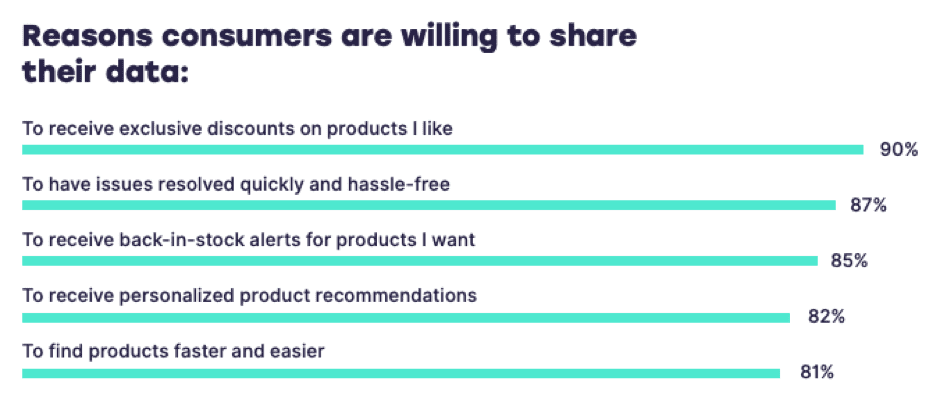
When it comes to the reasons that consumers share their data, the most popular reason is to receive discounts on products, with 90% of respondents selecting this reason. This could be the form of an email sign-up, with many e-commerce sites offering an immediate discount in return for a newsletter sign-up.
This reason was followed by getting issues resolved quickly and in a hassle-free manner, with 87% of consumers choosing this. The third reason to share data was to get back-in-stock alerts for products they are interested in purchasing.
Best communication methods
In order to provide personalization while allaying fears around privacy, brands need to look at ways they can accurately and safely collect data. This means being more sensitive when it comes to the way in which consumers want to be contacted. Personalizing messages via consumers’ chosen channels is more likely to see results and garner brand trust.
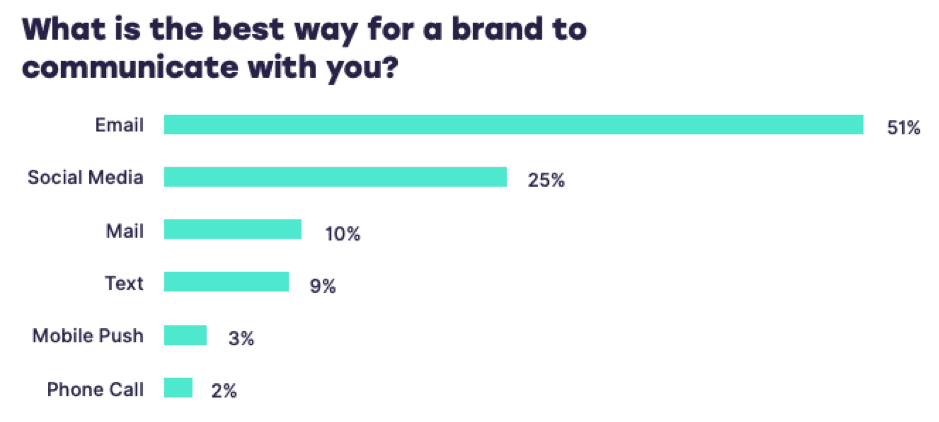
Some 51% of consumers say that the best way for brands to contact them is via email. This is a positive result for marketers, with many reporting that email is their top channel in terms of driving traffic and ROI.
Another popular communication channel is social media, with a quarter (25%) of consumers saying this is the best way for a brand to contact them. This suggests that tying in your email marketing and social media campaigns could see the best results in terms of ROI while also helping consumers to trust your brand more.
The least favourite methods of brand communication for consumers are mobile push notifications (3%) and phone calls (2%), showing that brands should allow consumers to engage with them when they feel like it, rather than forcing communication on them.
When does personalization become creepy rather than helpful?
As well as finding some methods of personalization unwanted, many consumers find brands’ tactics to be “creepy”. This can reduce their drive to engage with a brand and make it hard for marketers to regain that lost trust.
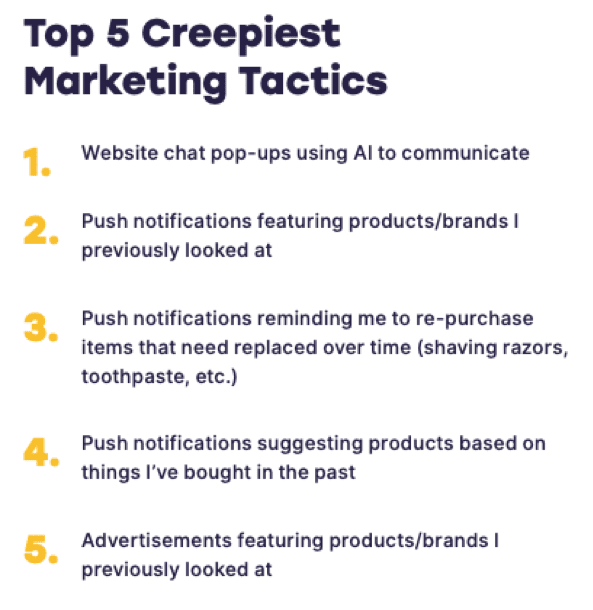
The ‘creepiest’ personalization tactic, according to respondents, is push notifications, which are ranked as being 74% ‘creepier’ than any other channel. One respondent said of push notifications: “I only want to be advertised to when I am on a website… not randomly on my phone. It’s like being stalked.” This is worth bearing in mind when you are creating a personalized marketing campaign.
However, it is not all demographics that feel the same way about push notifications. For Gen Z consumers, push notifications are 68% less creepy than they are for other generations, showing that accurate consumer targeting can really pay off.
These creep tactics have negative effects, with 63% of consumers saying they will stop buying from brands who use poor personalization tactics. In addition to this, 68% will tell friends or family about a ‘creepy’ brand experience, resulting in negative word-of-mouth, while 41% will leave a negative review. A third will also post on social media about the experience, with women being 15% more likely to complain about an experience like this using any of these channels.
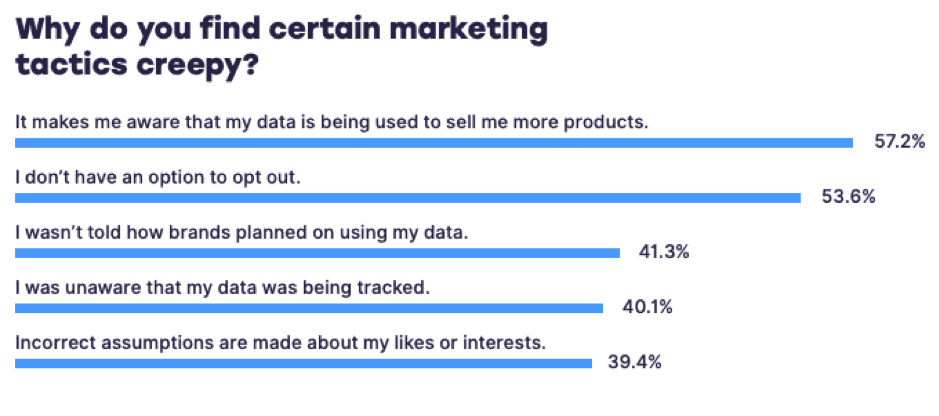
The top reason for personalization tactics to be viewed as creepy is because they make consumers aware that their data is being used to sell to them, which was selected by 57.2% of respondents. The fact that consumers don’t have an option to opt out was also a big reason for the creepy’ factor, with 53.6% finding this to be problematic.
These creepy marketing tactics are also found to be annoying for many consumers, which can mean they are even more reluctant to engage with your brand. In fact, 66.2% say that being targeted too many times makes these activities irritating, with 44.3% saying the same about being targeted for too long.
What these results show is that reducing the chances that consumers become frustrated with your marketing is key. You need to ensure they feel like a valued customer and not just like another sale. They also need the option to opt out of personalized communications in order to stop consumers feeling trapped.
Marketing tactics sought by consumers
In terms of marketing tactics that consumers find helpful rather than creepy, special discounts for products they want delivered via email is the most sought after. This ties in with the desire for easier and cheaper shopping experiences.
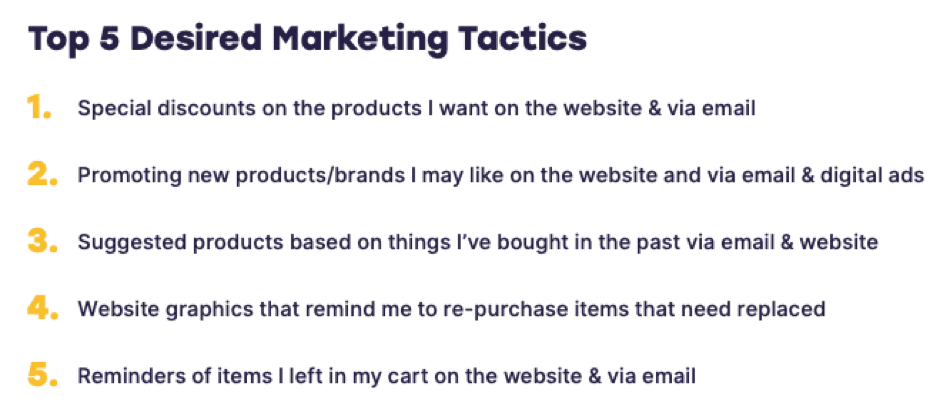
Other popular tactics include promoting products or brands a consumer may like, suggesting products based on past purchases and reminders of what has been left in their cart. When it comes to frequent shoppers, they find these types of personalization to be 25% more helpful compared to non-frequent shoppers.
All of these findings support the idea that consumers want brands to understand them better, including what they like and when they want information. Designing your personalization campaign to offer a smoother, easier and cheaper shopping experience is the ultimate aim.
Final thoughts
In order to truly see the best results from personalization, marketers need to ensure the tactics they are using are helpful and not invasive. Showing that your brand understands the wants of a consumer – including when they want to be left alone and have their personal space respected – will lead to the best ROI in the end.
With so many consumers being unsure whether they can trust brands with their data, it is important to show that you are using it only in the ways they want. Avoiding forceful and ‘creepy’ tactics can lead to negative sentiment, which can have a knock-on effect.
Instead, your personalization and use of consumer data should be designed so as to be as helpful as possible. Segment it and target it correctly to better reflect what individuals want in order to better nurture them rather than just sell to them. Not only will this result in better relationships between brands and consumers, but it will also help improve customer loyalty.